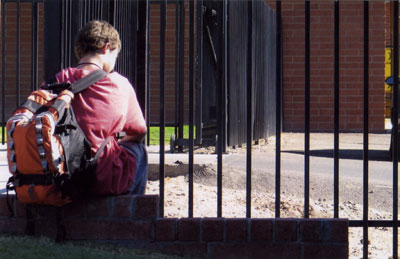All Nonfiction
- Bullying
- Books
- Academic
- Author Interviews
- Celebrity interviews
- College Articles
- College Essays
- Educator of the Year
- Heroes
- Interviews
- Memoir
- Personal Experience
- Sports
- Travel & Culture
All Opinions
- Bullying
- Current Events / Politics
- Discrimination
- Drugs / Alcohol / Smoking
- Entertainment / Celebrities
- Environment
- Love / Relationships
- Movies / Music / TV
- Pop Culture / Trends
- School / College
- Social Issues / Civics
- Spirituality / Religion
- Sports / Hobbies
All Hot Topics
- Bullying
- Community Service
- Environment
- Health
- Letters to the Editor
- Pride & Prejudice
- What Matters
- Back
Summer Guide
- Program Links
- Program Reviews
- Back
College Guide
- College Links
- College Reviews
- College Essays
- College Articles
- Back
Where Will I Go?
Fear, anxiety, confusion, anticipation, excitement. All around the nation, High School Seniors and Juniors are facing possibly the biggest decision of the lives: Where am I going to college?
For most, the college hunt truly starts junior year. At Arrowhead, students kickstart their search with their junior conference. They receive essential materials that will guide them and hopefully help them narrow down the mass of school possibilities.
Guidance Counselor Kathie Mitich advises ranking personal factors like, location, size, academics, and expenses, in order of personal preference.This way, a student can start searching for schools that meet their most valued requirements. Mitich also recommended a point system to help rank these factors. A point system helps solidify the order based on math and helps sort out conflicted emotions or opinions.
Databases and college websites like carrercurzer.com or collegeboard.com sorts colleges based on these factors. They provide a starting list and statistics on schools and these resources provide essential information to students which assists in finding a school that is liked well enough to pay a visit.
When visiting a school, it is important to really get a feel for the atmosphere. It is important to ask questions. Talking to teachers and students can provide authentic insights on dorm life, student activity, and curriculums. Spending time at a sporting event can be a great way to spend time with your possible future peers. These are essential activities during a school visit. If you are hung up on what to ask, there are question sheets available in the guidance office.
The most important thing for a college bound athlete is to make sure that they have NCAA eligibility. To find out check with your counselor and the NCAA website. If not, playing a sport may not be an option. If eligible, a student may want to contact their school’s coach for their sport. Also, taking a camp at the college may be a beneficial way to get a feel for the coaching style.
No matter where a student decides on going to school, financial aid and scholarships can help contribute to the cost of the school. There are plenty of scholarships available, one just has to know where to look. The internet is a great place to start, but with so many possibilities how is one to know which to apply for? First, check with the schools that you are applying to. If they have available scholarships, great! However, if none is obtainable, ask a guidance counselor. They have information on local scholarships and other places to search.
Mitich says, “ When you write an essay for a scholarship, try to find a perfect balance of answering the prompt and personalizing your narrative.”
Juniors and Seniors, no matter what college you are thinking about, remember to make an informed decision but also follow your gut. Visualization can be a great tactic to utilize when facing a difficult decision. Can you see yourself at the school? No matter your reasons behind the school, remember no school is perfect, so try to find one where you will happily spend the next years of your life.

Similar Articles
JOIN THE DISCUSSION
This article has 0 comments.